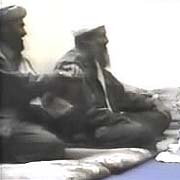This is a piece of news from the New York Times newspaper (www.nytimes.com) on Sunday, December 16, 2001
By JAMES RISEN and JAMES DAO WASHINGTON, Dec. 15 — The United States has intercepted radio communications in recent days that officials said appeared to record Osama bin Laden giving orders to Al Qaeda troops in the mountainous region around Tora Bora, where Afghan and American soldiers are engaged in fierce combat with the enemy. The report provides the strongest evidence yet that Mr. bin Laden has not fled the country, the American officials said. American intelligence experts who have listened to the intercepted communications are "reasonably certain" that the voice is that of Mr. bin Laden, one of the officials said. As the intensive American bombing campaign of the Tora Bora region continues and hundreds of Al Qaeda fighters have been killed, given up or been captured, officials said it appeared that Mr. bin Laden was pinned down and running out of options. Afghan militia have captured between 200 and 300 Al Qaeda fighters in the Tora Bora region during intense fighting in the past five days, including more than 50 on Friday alone, Rear Adm. Craig R. Quigley, a spokesman for the United States Central Command, said today. "As opposition forces come across people they think we'd be interested in, they have been offering us the opportunity to sit in on the questioning," Admiral Quigley said. "We would approach them and ask to take custody of those people if we thought they were important." But an American official said that it was not believed that any of the prisoners were high-ranking Al Qaeda leaders, and instead were mostly rank-and-file fighters. Many of them are Arabs, the American official said. The ability to intercept Mr. bin Laden's communications represents a dramatic improvement over the conditions the United States faced before the start of the military campaign in Afghanistan. For the last few years, American intelligence officials and policy makers said that Mr. bin Laden was very cautious about speaking on radio or cellphone channels that might be intercepted. They said that after the August 1998 American cruise missile strike on Al Qaeda terrorist training camps near Khost, Afghanistan, which were timed to hit while Mr. bin Laden was there holding a meeting, the Saudi exile realized he had to be more careful about discussing his plans over cellphones or by other electronic means. After that attack, which officials say missed Mr. bin Laden by about an hour, he shunned many forms of modern communications and instead would often pass messages directly to subordinates, who would then go away from him before using electronic communications. His caution made him much more difficult for the C.I.A. and the National Security Agency, which intercepts communications, to track. But the American-led military campaign has forced him back on the air as he tries to sustain Al Qaeda as a fighting force in the face of the defeat of the Taliban. So far, only three high-ranking Al
Qaeda leaders have been identified by American intelligence as having been
killed in American bombing raids in Afghanistan since the military campaign
began in October. The highest ranking is Muhammad Atef, Al Qaeda's chief
of military operations, accused of being one of the planners of the Sept.
11 attacks. Answer these questions: 1. Do Americans think that Osama bin Laden has left Afghanistan at the moment? Why? 2. Are they sure the voice they heard was that of Mr. bin Laden? Why? 3. How many Al Qaeda fighters have Afghan militia captured in the Tora Bora region in the past five days? 4. Where did an American cruise missile strike in August 1998? 5. Is bin Laden careful when speaking on radio or cellphone? Why? 6. What does C.I.A. mean? 7. Who is the most important Al Qaeda leader killed in Afghanistan? Why was he so important? 8. Look for in the text and write down
at least 12 words related to "war". A. How many of the questions above have you been able to answer because you had read the text in catalan before? B. How many questions have you answered
because you have understood the text in English?
|
 U.S. Believes It Has Recorded
Radio Messages From bin Laden
U.S. Believes It Has Recorded
Radio Messages From bin Laden